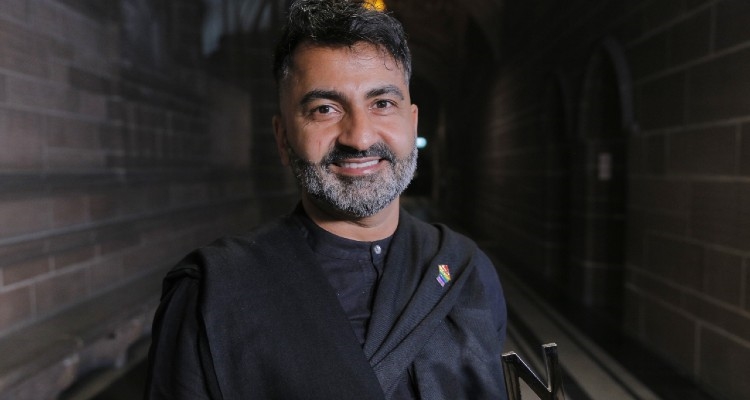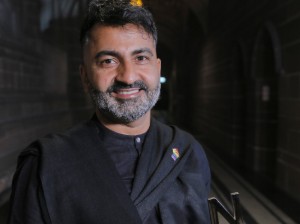Mon 21 Mar 2022

Mayor of London EDI advisor Laks Mann (pictured) comments on key challenges public sector organisations face when creating diverse and inclusive workplaces for their staff and how to overcome those barriers
By Murielle Gonzalez
Institutional racism and social mobility are top D&I challenges within public sector organisations, according to Laks Mann, Metropolitan Police Officer and Mayor of London EDI advisor. In conversation with Dods Diversity & Inclusion, he explained that those barriers are connected to a third top challenge – recognising intersectionality. "There are people of colour with a disability and queer people of colour. These are layers of the intersectional narratives that people have, and they come with multiple barriers and challenges that overlay and compound" he said.
Commenting on racism, Mann explained: "In 2022, there's still racism in society, and many are still unwilling to accept that there is racism in the workplace," he says. "We really must get to a stage where we can no longer be in denial. Let's not pretend that we have made substantial progress when it’s clear that younger generations of people are coming into the workforce and are still experiencing racism."
Mann, who has South Asian heritage and a multi-disciplinary cross-sector career background with the Met, Deutsche Bank, PwC, Jones Lang LaSalle, and NatWest, took on the EDI advisor at the Mayor of London in 2019, advocating through a lens of race, ethnicity, faith, LGBTQ+, and working-class lived experiences.
We caught up with Mann to examine what public sector organisations can do to overcome the barriers to a truly diverse and inclusive civil service.
Why do you think there is denial?
Often people go into denial because they are not affected by racism. They have not experienced it, and they do not have people in their family, friends, or professional networks affected by it. Racism doesn't exist for them.
Sometimes people of colour working in organisations also deny racism in the workplace, but we can't deny the experiences of other people who describe being affected by it. Denial should not be the dominant narrative.
How can organisations deal with such a challenge?
Organisations can look at their processes, procedures and decision making to examine the factors that allow inequalities, behaviours and actions to take hold and become embedded. Acknowledging how these manifest into the DNA of their workplace culture and become codified as the norm, and yet negatively impact others.
Think about it from the staffing pipeline. Look at who is recruited, developed, promoted, and who is given support and allowed to move through the organisation. Look at who is criticised for their mistakes and who has their careers stalled when similar errors from other people are overlooked and ignored. As a result, you're making it clear that success equates to being white.
That's the intersectionality challenge. It requires organisations to look at the workplace with a lens that recognises the different layers of lived experiences. Organisations need to check if decisions and processes are put in place (whether it's conscious or unconscious), making it harder for people of colour, people of colour with a disability, or queer people of colour to be seen and treated with equity.
Organisations that do this reflexivity exercise can then act on it.
Can staff networks help promote cultural change?
Organisations have race networks and several other staff networks, but it’s important to understand that these groups were often born out of need. There were issues in the workplace that needed to be highlighted and people needed to come together for support. Strength in numbers.
Staff networks can sometimes be seen as a tick-box exercise, pushed to the side, seeing them as problematic because of the issues raised by people in those network.
Progress has been slow, but when staff networks are part of the organisation's ethos, they can help shape the culture rather than being denied that opportunity.
What gets in the way?
Sometimes there is a fear of losing status. Look at people in a race network; they could be much more junior than those in decision-making roles or have a different background. People in the dominant culture don't want to lose power or influence, whatever they think that is. Therefore, they want to keep other staff out of the conversation but have them visible when it suits the majority culture. Sadly, it can sometimes become a fight.
Are leaders well placed to address this power struggle?
The problem is that there are often no leaders in the room. Organisations need to think about who they listen to when having these conversations. Leadership exists in the staff networks – it can be anybody. A leader could be a person of seniority or someone in middle management or junior staff. This challenge is a call to believe in a different paradigm of what leadership looks like. Not all leaders are supervisors; not all supervisors are leaders
Are you hopeful about making progress in D&I?
We are seeing people and organisations waking up to the challenges. We're seeing people who have always wanted to do that but probably didn't feel empowered now increasingly coming forward. There is always the challenge of navigating privilege power and influence, which come into play when up against dominant cultures.
However, I'm excited to see people thinking this is not good enough and organisations recognising that they need to 'fast forward' in equality and diversity. People are being proactive, and that’s always the best place to be.
What is your advice to civil servants committed to playing their part?
It's easy to internalise issues of inequality when people are on the receiving end. And it's easy for colleagues in those minority groups to feel that they must take these issues on. But suddenly, the pressure is placed upon them to change workplace cultures when all they want to do is to be able to do their job. It’s for (senior) supervisors to show leadership and work in coalition with their staff.
My key advice is about being safe. You can often be up against dominant cultures who will be selective about when they exercise their levers of privilege, power and influence. So, make sure you are aware of that, and you have tools, mechanisms and support networks from inside and outside the civil service to ensure your physical and psychological safety. Check-in with others, and check out (temporarily) if you need to so that you don’t feel you’re being diluted. First and foremost, stay true and authentic to yourself.
Equip yourself with the tools and mechanism to support your colleagues at work at upcoming events:
Supporting LGBT+ Colleagues at Work | 19 April - online
Learn more
Women in Communications | 28 April - London
Learn more
D&I for Line Managers | 10 May - online
Learn more
Women into Leadership | 19 May - Edinburgh
Learn more
Supporting Mental Health at Work | 31 May - online
Learn more
ABOUT THE AUTHOR
Murielle Gonzalez, content strategy manager at Dods Diversity & Inclusion, is an experienced journalist and editor. She can be reached on murielle.gonzalez@dodsgroup.com.
View all news